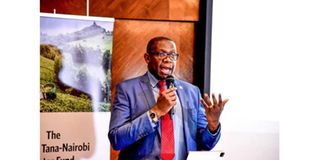Male CEOs breaking the gender bias

Nairobi Securities Exchange CEO Geoffrey Odundo on December 7, 2021.
What you need to know:
- Women face more severe legal, regulatory, and administrative barriers to starting and running businesses than their male counterparts.
- These three executives have committed to improving female entrepreneurs’ access to funds.
A report by the World Bank on ‘Gender and Economic Growth in Kenya’ shows that women face more severe legal, regulatory, and administrative barriers to starting and running businesses than their male counterparts.
These three executives have committed to improving female entrepreneurs’ access to funds.
Geoffrey Odundo, Nairobi Securities Exchange
Geoffrey Odundo has been the chief executive officer (CEO) of the Nairobi Securities Exchange (NSE) since March 2015.

Nairobi Securities Exchange CEO Geoffrey Odundo on December 7, 2021.
A seasoned investment banker, he has held senior roles in asset management, corporate finance and stock brokering in the almost three decades he has spent in the financial sector.
The NSE has been championing gender equality in collaboration with other investors, regulators and the private sector. In 2016, he joined 34 other CEOs across the globe in signing up in support of the Women’s Empowerment Principles (WEPs), which outline seven steps to empowering women in the workplace, marketplace and community.
Every year on International Women’s Day, it joins other global exchanges to Ring the Bell for Gender Equality to raise awareness of the business case for women’s economic empowerment, and the opportunities for the private sector to advance gender equality and sustainable development.
Ring the Bell for Gender Equality is a partnership between UN Women and International Finance Corporation (IFC), Sustainable Stock Exchanges (SSE) Initiative, UN Global Compact, the World Federation of Exchanges and Women in Exchange-Traded Funds (ETFs).
Under Mr Odundo’s leadership, the NSE in 2021, joined the ‘30% Club’, a global campaign taking action to establish gender equality in high-level corporate leadership. The NSE committed to engaging listed companies to ensure at least 30 per cent representation of women on their boards and in senior management.
The NSE also runs a signature initiative, dubbed Leadership and Diversity Dialogue, which uses forums and surveys to sensitise listed companies to aspects of leadership and diversity in relation to firm performance.
To that effect, in 2019, the NSE, in a survey, evaluated 60 leading companies on their performance on gender equality in the workplace, in partnership with Equileap and New Faces New Voices — organisations that provide gender equality data and insights in the corporate sector.
The report has informed regional and global markets of the advances made so far on gender equality in the workplace and provided a benchmark for other African-listed companies.
Kariuki Ngari, CEO Standard Chartered Bank
With 23-year experience in retail banking, Kariuki Ngari has been the CEO at the Standard Chartered Bank since 2019. He is credited with transforming the consumer banking divisions of the bank.

Standard Chartered Bank CEO Kariuki Ngari (R) with Standard Chartered Head of Consumer, Private and Business Banking Edith Chumba and Sagi Vaknin, CEO Artcaffé Group (L) during the launch of the lender's co-Shared space with Artcaffé at Britam Centre, Upper Hill, on December 9, 202.
With Mr Ngari at the helm, the bank has made commendable efforts in championing gender diversity. It ranked as the best performing company in Kenya with a gender equality score of 63 per cent in the 2019 Equileap report, for its flexible working policy, parental leave policy and fair pay charter, among other notable strides.
To increase diversity in technology and entrepreneurship while developing women entrepreneurial and leadership excellence, the bank, in 2017, launched an incubator program called Women in Tech (WIT) for female founded businesses.
Every year, more than 10 small and medium businesses receive mentorship and networking opportunities. The top five companies from WIT access Sh1 million each as seed capital and investor forums to ensure their businesses match international standards.
The programme is part of the bank’s community engagement strategy, Futuremakers by Standard Chartered, in partnership with @iLabAfrica through Strathmore University’s Incubation Centre known as @iBizAfrica.
In April last year, Mr Ngari led the bank in launching Women in Tech Access to Capital initiative that aims to fund female entrepreneurs to help them grow their businesses.
Through the Futuremakers initiative, Standard Chartered Bank would initially provide Sh5million revolving funds to enable WIT alumni to access interest-free and collateral-free loans capped at Sh100,000 for working capital and Sh200,000 for capital expenditure with a 12-24-month repayment period.
Charles Mudiwa, CEO Stanbic Bank Kenya and South Sudan
Charles Mudiwa is an expert in business planning, financial risk, risk management, corporate finance, and strategic planning, with 20-year experience in banking.

Stanbic Bank Kenya Chief Executive Charles Mudiwa during the UN Women-Stanbic Bank Women Empowerment Principles (WEPS) signing ceremony at the Capital Club on February 2, 2022.
Under his management, the bank has shown unwavering support for women. The 2019 Equileap report named it among the six companies that were gender-balanced in their senior management and boards.
On February 2, this year, it became the 50th signatory of the Women Empowerment Principles, joining a global network of over 5,000 companies. Stanbic adopted five of the seven principles that include high-level corporate leadership; treat all women and men fairly at work without discrimination; enterprise development, supply chain and marketing practices; community initiatives and advocacy; and measurement and reporting.
In 2019, it launched DADA platform, a financial proposition focusing on women-led formal and informal enterprises, offering both financial and non-financial solutions.
The initiative, a strategy to tackle gender inequality in the financial sector, has benefited over 29,000 women so far.
The bank also joined the Sourcing2Equal Kenya (S2E), a program implemented by IFC with the support of Women Entrepreneurs Finance Initiative (We-Fi) and Norway to advance gender-inclusive sourcing in Kenya.





